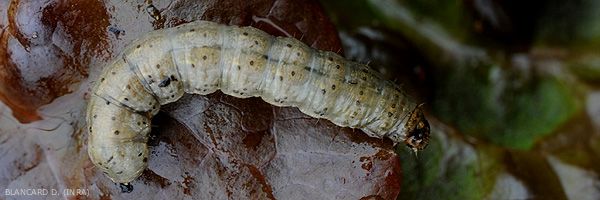Other land-based pests
Several pests are capable of gnawing, devouring the roots and the neck of salads. Adult insects, caterpillars and larvae, thus attack seedlings and adult lettuces.
In many cases, the culprit (s) are not very far away. By looking closely at the affected plant (s) and their environment, we can find the pest (s) involved. The main pests that can be involved in this root damage are mentioned in the following table.
| Organs attacked and nature of damage |
Last name | Description of the pest |
| Roots devoured |
Melolontha melolontha
(ver blanc, hanneton commun)
|
Larvae 3 to 3.5 cm long, white in color. The head and legs are brown and shiny (Figure 1). |
| Roots devoured and collar perforation |
Agriotes spp.
(yellow worms, wireworms, wireworms)
|
Cylindrical larvae of 2.2 to 3 cm long, yellowish-brown in color and shiny, cylindrical to subcylindrical (Figure 2). |
| Gnawed collar |
Hepialus spp.
(hepials)
|
Caterpillars 3.5 cm long, white, shiny and translucent. Light brown head and prothoracic plate. |
| Root collar and gnawed roots |
Tipula spp.
(tips)
|
Larvae 3.5-4.5 cm long, greyish and dull in appearance. Head black, small and inconspicuous (figure 3). |
| Gnawed collar and leaves near the grazed ground |
Bourletiella hortensis
(garden springtail)
|
Black to dark green adults, 1.5 mm long. Big head with long antennae. Eyes black, prominent, circled in yellow. |
| Gnawed collar and cut leaves |
Agrotis spp. ...
(cutworms, soil-dwelling moths)
|
Caterpillars 3.5 cm long, fleshy, variable in color, greyish to greenish, topped dark spots or bands (figures 4 to 7 |






